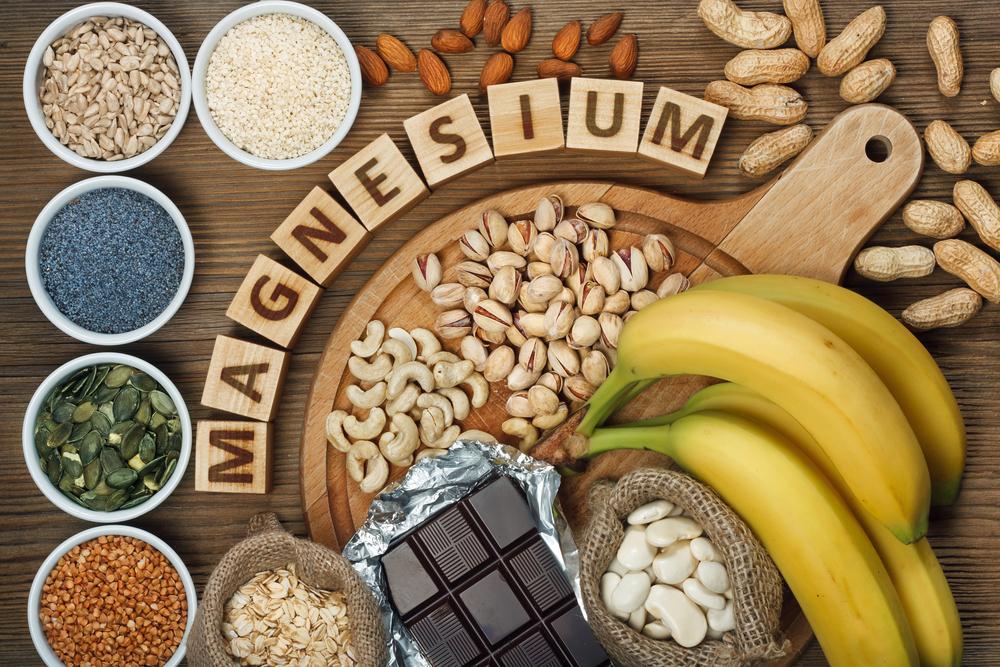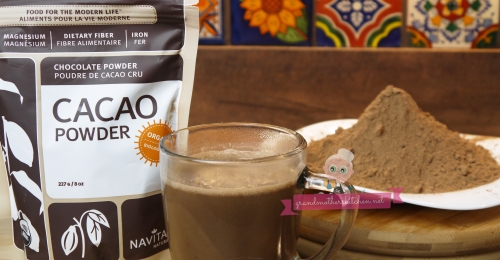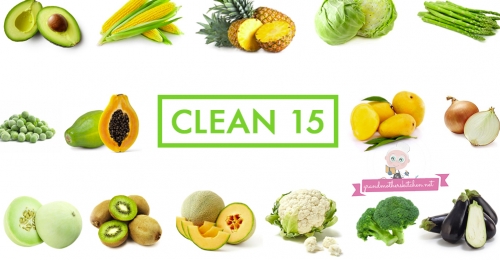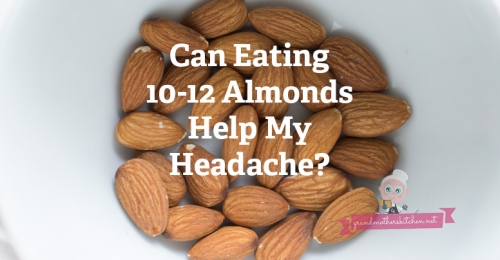Can Food High in Magnesium Make Me Happier?
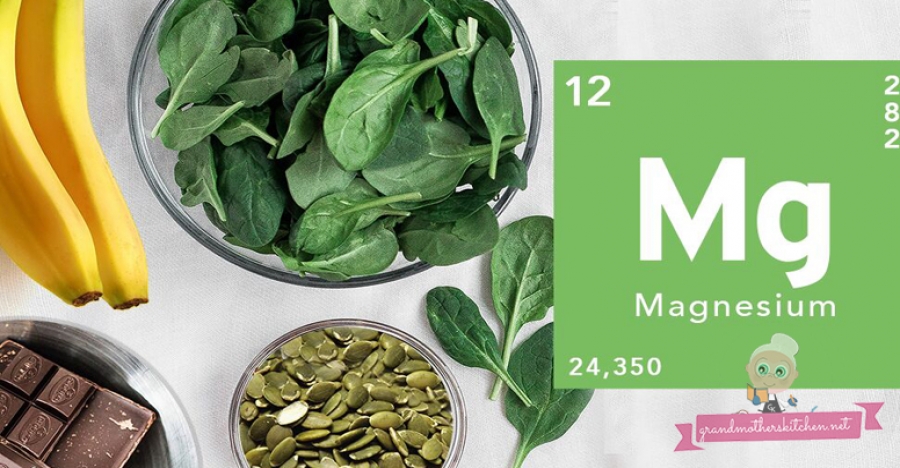
About this Recipe
About The Author: Article written by Heidi Rasmussen, co-founder of Grandmother’s Kitchen, nutritionist (BSc Nutrition & Dietetics), yoga teacher (RYT), writer, and wellness researcher from British Columbia, Canada.
Can Certain Foods Really Make Me Happier?
I know from personal experience that I am subjectively happier when I am eating Chocolate Chip Cookies, but aside from my own cookie bliss, what this article is really about is whether the nutrient, magnesium, has the capacity to improve depression.
Why is Magnesium Deficiency a Concern At All?
The soil on earth in many places that our food is grown is depleted of minerals, and therefore certain crops and vegetables that are grown in depleted soil are not as rich in minerals as they would be in nutrient dense soil. According to current statistics (7) nearly half of the US population consumes less than the recommended amount of dietary magnesium for optimal health.
What is Dietary Magnesium and What Foods Are High in Magnesium?
Magnesium, is a mineral found in the human body that is important for all sorts of functioning. Dietary magnesium is found in all kinds of food. The daily recommended amount of magnesium for a healthy adult is approximately 300mg–400 mg/day, but can vary depending on age, gender and other health factors (7).
Some examples of good sources of magnesium in some favorite foods:
(Search Nutrients in Any Food)
28gram dark chocolate (+70% cacao) - 64mg magnesium
1 medium avocado - 58mg magnesium
1 large banana - 37mg magnesium
1/2 cup cooked spinach - 83mg magnesium
1/2 cup cooked swish chard - 80mg magnesium
1 medium cooked potato, with skin - approx 50mg magnesium
1/2 cup cooked quinoa - 63mg magnesium
3/4 cup cooked black-eyed peas - 121mg magnesium
3/4 cup cooked navy, black, white beans - approx 70mg magnesium
1/4 cup pumpkin seeds, shelled - 317mg magnesium
1/4 cup brazil nuts, shelled - 133mg magnesium
1/4 cup sunflower seeds, shelled - 115mg magnesium
1/4 cup almond, shelled - approx 100mg magnesium
1/4 cup cashews, shelled - 90mg magnesium
2 Tablespoons flaxseeds - 111mg magnesium
2 Tablespoons sesame seeds - approx 60mg magnesium
2 Tablespoons peanut butter - approx 53mg magnesium
2.5 oz cooked salmon - 92mg magnesium
Why is Magnesium Important in Human Health?
Magnesium has many many roles in the health functioning of the human body. A few important examples of roles of magnesium include (5):
* Magnesium helps to regulate numerous cellular functions and enzymes
* Magnesium plays a role in our cells energy release from nutrients
* Magnesium plays a role in DNA/RNA synthesis
* Magnesium plays a role in cellular signaling
Some other interesting findings about magnesium and human health (5):
* Studies suggest that there is a lower occurrence of type II diabetes in people with higher magnesium intakes.
* Studies suggest that people with type I and type II diabetes were associated with lower serum magnesium level when compared to people who do not have diabetes.
* An entire list of human health concerns such as cardiovascular illnesses, metabolic illnesses, skeletal problems, respiratory issues and neurologic distress (such as stress, anxiety and depression) are linked to low magnesium.
* Magnesium is an important part of our bones and play an important role in bone mineralization.
* Optimal magnesium is also essential for healthy heart functioning and maintaining the rhythm of the heart.
* Magnesium may help to maintain healthy blood pressure.
* Magnesium may decrease the likelihood of heart attacks and strokes.
Clinical Evidence - Can Magnesium Help with Depression?
Why are we talking about depression? Current statistics from the World Health Organization (6) indicate that depression is a leading cause of illness and disability around the world. Apparently, there are more than 300 million people who are reportedly living with depression, which is an increase of more than 18% between 2005 and 2015. Yikes.
Some Evidence that Magnesium Helps Depression:
Findings from a 2018 study (2) of 17,730 adults in the United States suggests that there is definitely an inverse relationship between depression and dietary magnesium intake. In other words, adults with higher risk of depression had lower intakes of dietary magnesium. The relationship seemed to be stronger for women also. Limitations of the study are that with a cross-sectional study like this it is impossible to say that low magnesium causes depression or that increasing dietary magnesium has the probability of relieving depression.
In a study conducted in 2017 (3) researchers suggest that consumption of 248 mg of elemental Magnesium Chloride daily for 6 weeks improved depression scores by a statistically and clinically significant mean. The improvement in symptoms of general anxiety and depression was observed within weeks of supplementation. Also, the effect was somewhat diminished within 2 weeks of stopping supplementation. The negative effects of taking magnesium were not so severe as to stop participants from taking the supplement except for in one case of nausea and lethargy. Participants did report that they experienced other clinically significant positive effects of taking magnesium, such as a decrease in headaches and a decrease in muscle cramps.
On top of these 2 studies, there are many other researchers looking at this topic. Just search in PubMed and you will find a multitude of studies looking at magnesium and depression.
Some Evidence That Magnesium Does Not Help Depression:
A supremely important note about all of this, is that there are also studies that found no positive effect of changes in depression, mood or anxiety from magnesium supplementation.(4) A somewhat confounding but interesting table shows how confusing nutrition claims are. The table shows 8 different studies with varying results.
Each study has different subjects, uses different forms of magnesium, measures anxiety and depression using different scales for measurement, and use entirely different dosages of magnesium. (View Comparison Table of Magnesium Studies for Depression)
Ingredients
Return to this Can Food High in Magnesium Make Me Happier? article or check out more recipes at Grandmother's Kitchen
So, Does Magnesium Help with Depression?
After reading all the slightly confusing findings about magnesium and depression, we at the very least can feel confident that we need a certain amount of magnesium for optimum health and functioning of our body.
We can also say that magnesium deficiency is not something we want to mess around with and will certainly continue to eat our daily pumpkin seeds, beans, avocado, potatoes, spinach, bananas and high quality cacao to name a few.
There is not concrete evidence that says for sure that magnesium will help with depression, but there are several studies that suggest that it may help certain populations with the relieving of depression.
***Of course, if you do plan to take higher doses of magnesium for any condition, it would be very important to speak with a trusted health professional before making these sorts of changes since high doses of magnesium coming supplements or medications can result in diarrhea or worse for certain populations, and also can interact with certain pharmaceutical drugs like bisphosphates, antibiotics, diuretics, and proton pump inhibitors (7).
It seems unlikely to consume (via diet alone) too much magnesium. Also, evidence suggests (7) that toxicity of magnesium from food does not pose a health risk in healthy individuals since the kidneys will eliminate the excess amounts in our urine. (Note - this might of course be different if someone has kidneys that are not functioning).
As always, when writing about nutrition, I wish there was a final answer that fit everyone and made it all very easy, but that simply does not exist in nutrition research. There is always evidence ‘for’ and ‘against’ just about any nutrition claim, which is why it can be so confusing.
Also every body is different and so my personal advice is to find a health professional you trust and can chat with, continue to do your own research and reading from trusted sources, and then pay attention to your body as you make nutrition changes.
Want to Know More About Supplementation?
Curious who to ask questions about magnesium supplementation? At Grandmother's Kitchen, we highly recommend the staff at the Vitamin King (a small local family run shop) who are super helpful via phone, email, or in person if you are in the area. For a our special discount on any Vitamin King product you can use the COUPON CODE: GRANDMA .
References: (1)"How eating better can make you happier," Examine.com, published on 19 May 2015, last updated on 22 October 2018, https://examine.com/nutrition/how-eating-better-can-make-you-happier/ Read more.
(2) Sun C1, Wang R2, Li Z1, Zhang D3. Dietary magnesium intake and risk of depression. J Affect Disord. 2018 Dec 27;246:627-632. Read more.
(3) Emily K. Tarleton, Benjamin Littenberg, et al. Role of magnesium supplementation in the treatment of depression: A randomized clinical trial. PLoS One. 2017; 12(6) Read more.
(4) Beata Ryszewska-Pokraśniewicz,1 Anna Mach,2,* Michał Skalski et al. Effects of Magnesium Supplementation on Unipolar Depression: A Placebo-Controlled Study and Review of the Importance of Dosing and Magnesium Status in the Therapeutic Response. Nutrients. 2018 Aug; 10(8): 1014. Read more
(5) Mohammed S. Razzaque1,. Magnesium: Are We Consuming Enough? Nutrients. 2018 Dec; 10(12): 1863. Read more
(6) World Health Organization. Depression. [Accessed Jan 12, 2019]; https://www.who.int/mental_health/management/depression/en/ Read more
(7)National Institute of Health. Magnesium- Fact Sheet for Health Professionals Read more
